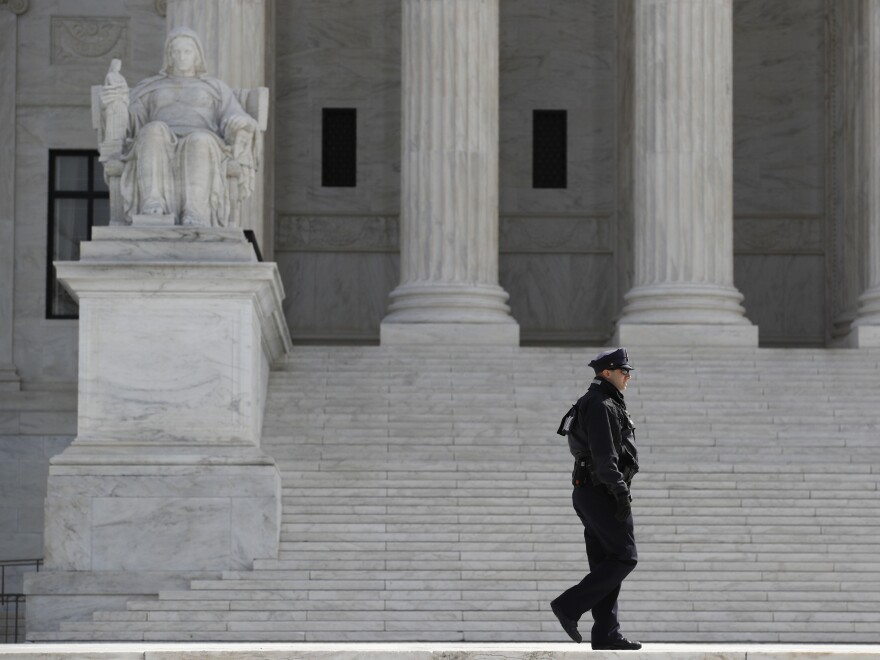The U.S. Supreme Court has once again postponed oral arguments scheduled for this spring, but this time the court seemed to hint it might not hear arguments in most cases until next term.
Following postponement of arguments scheduled for the last two weeks of March, the court on Friday announced that it would delay another round of oral arguments — its last for the term — scheduled for the second half of April.
In a press release, the court said it would "consider a range of scheduling options and other alternatives if arguments cannot be held in the courtroom before the end of the court term," which usually is, for all practical purposes, at the end of June when the court completes its work and recesses for the summer.
The wording of the press release would seem to suggest, however, that the justices may postpone some cases until next term and extend the current term to hear a few particularly pressing cases.
Among them are three cases involving subpoenas for President Trump's financial records: two involving congressional subpoenas, and another involving a New York grand jury subpoena for financial records relating to alleged hush money payments to porn star Stormy Daniels and another woman during the 2016 presidential campaign.
Two other cases from Washington state and Colorado could have a direct impact on the upcoming 2020 presidential election. They provide a test of state laws that punish or remove Electoral College delegates who do not cast their ballots for the presidential candidate they were pledged to support.
Some of the justices might prefer to defer the Trump cases, on theory that if Trump were to lose the election, the claims of presidential immunity would go away, but such a postponement would likely draw criticism that the court is acting in a political manner and in aiding President Trump.
Some advocates of live TV coverage have instead been pushing to have the justices hear oral arguments via remote TV hook-up. While some lower federal courts have done that with three-judge panels, most court observers believe that would be too unwieldy for a court with nine members, eight of whom ask as many as 75 or more questions altogether in a half hour of argument.
As it is, the justices often interrupt each other and counsel to the point that the chief justice sometimes has to gently restrain his colleagues. Only Justice Clarence Thomas abstains from asking questions; he doesn't ask questions for years at a time. For the rest of the justices, though, oral argument is often something of a dignified free-for-all.
Moreover, the justices themselves have adamantly opposed live broadcast of their proceedings, and they know quite well that if they allowed such coverage now, it would be hard to put the genie back in the bottle after the coronavirus crisis is over.
Still, as SCOTUSblog publisher Tom Goldstein has suggested, it is possible that it will be too dangerous for there to be open court proceedings at all for at least a year or more, or until there is a COVID-19 vaccine. It is not only a question of public safety, or the safety of lawyers who would have to travel to Washington, D.C., to argue their cases, but there is also the safety of the justices themselves to consider.
Six of them are 65 or older, putting them in the high-risk category. They sit quite close to each other on the bench, not in the safe social-distancing range. But even assuming that their chairs could be somehow rearranged to be 6 feet apart, which is quite an assumption, the public could not be safely admitted. Indeed, only the roughly 25 permanently accredited reporters who cover the court could be accommodated, sitting several seats apart in the courtroom.
The court undoubtedly will bide its time in making any decision on how to handle the oral argument question, understanding that much is at stake.
But if the current situation persists into the fall, the justices likely will have to make some hard choices. They might opt to try oral argument by remote video, or they could decide cases based on the briefs alone, and without oral argument.
That, however, would be a radical departure from custom for an institution that does just about everything based on tradition and precedent. Indeed, while the court did postpone oral arguments during the 1918 flu pandemic, it did not dispense with it, instead hearing delayed oral arguments later in the year
Copyright 2021 NPR. To see more, visit https://www.npr.org.









